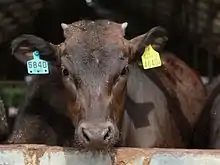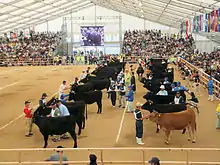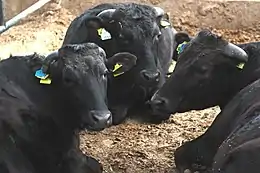黑毛和牛
黑毛和牛(日语:)是日本肉牛的一個品種,為日本6種本土家牛品種之一[4],以及4種日本和牛品種之一[5]:420。所有和牛品種皆為20世紀早期將本土日本牛種與歐洲等地進口之牛種雜交而成[6]:5。以黑毛和牛而言,與歐洲地區雜交的牛種分別有布勞恩牛、短角牛、德溫牛、西門塔爾牛、愛爾夏牛與霍爾斯坦牛[3]。
 | |
| 保護狀態 | FAO(2007):無威脅[1]:71 |
|---|---|
| 別名 |
|
| 原產地 | 日本 |
| 分佈 | 關西、中國、四國、九州地區 |
| 應用 | 肉牛 |
| 特徵 | |
| 體重 | 雄:809公斤[2]:210 |
| 雌:512公斤[2]:210 | |
| 身高 | 雄:145公分[2]:210 |
| 雌:129公分[2]:210 | |
| 毛 | 黑色[3] |
| 長角狀態 | 兩性皆有 |
| 家牛 Bos primigenius | |

長崎縣佐世保市舉辦之和牛展中的黑毛和牛。

兵庫縣北部的但馬牛品系。
歷史
在第2世紀的彌生時代,日本從中國引入牛隻,作為稻米耕作之用[2]:209。直到1868年明治維新時期以前,日本的牛隻僅作為農業、林業、礦業與交通運輸的役用動物,以及作為肥料的來源。此時尚不清楚是否用於乳業,但由於文化與宗教原因,不會食用牛肉。牛在當時屬於貴重物資,低收入的農戶無法購置[6]:2。
1635年至1854年,日本實質上與世界其他地區隔離,因此在這個時期,不太可能有外源基因混入日本牛群當中。1868年至1887年的明治維新時期,有2,600頭外國牛隻進口;起初人們對於將外國牛隻與本土牛隻雜交的興趣不大,但自1900年起得到廣泛運用。不過在1910年,雜交工作突然停擺,因為人們發現雜交可以得到體積大的牛隻及高品質的牛乳,但工作能力與肉品品質則變差。1919年起,人們將之前因雜交而產生的各地異質牛群進行登記,並選育成為「改良日本牛」。1944年,依據與日本本土牛隻雜交的外國牛隻種類,共選出4個品種,承認為和牛品種,分別為黑毛和牛、褐毛和牛、無角和牛與日本短角牛[6]:8。
脚注
注釈
出典
- Barbara Rischkowsky, D. Pilling (eds.) (2007). List of breeds documented in the Global Databank for Animal Genetic Resources, annex to The State of the World's Animal Genetic Resources for Food and Agriculture. Rome: Food and Agriculture Organization of the United Nations. ISBN 9789251057629. Accessed January 2017.
- Valerie Porter, Lawrence Alderson, Stephen J. G. Hall, D. Phillip Sponenberg (2016). Mason's World Encyclopedia of Livestock Breeds and Breeding (sixth edition). Wallingford: CABI. ISBN 9781780647944.
- Breed data sheet: Japanese Black/Japan. Domestic Animal Diversity Information System of the Food and Agriculture Organization of the United Nations. Accessed January 2017.
- Breeds reported by Japan: Cattle. Domestic Animal Diversity Information System of the Food and Agriculture Organization of the United Nations. Accessed January 2017.
- T. Muramoto, M. Higashiyama, T. Kondo (2005). Effect of pasture finishing on beef quality of Japanese Black steers. Asian-Australian Journal of Animal Science 18: 420–426.
- Kiyoshi Namikawa (2016 [1992]). Breeding history of Japanese beef cattle and preservation of genetic resources as economic farm animals. Kyoto: Wagyu Registry Association. Accessed January 2017.
- Daniel Krieger (26 August 2010). All for the love of Tajima cows. The Japan Times. Accessed January 2017.
- [National Institute of Agrobiological Sciences] (2005). Country Report: Japan, annex to The State of the World's Animal Genetic Resources for Food and Agriculture. Rome: Food and Agriculture Organization of the United Nations. ISBN 9789251057629. Accessed January 2017.
This article is issued from Wikipedia. The text is licensed under Creative Commons - Attribution - Sharealike. Additional terms may apply for the media files.